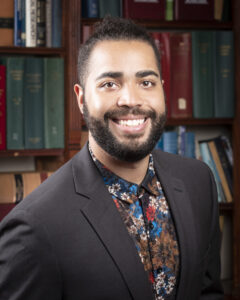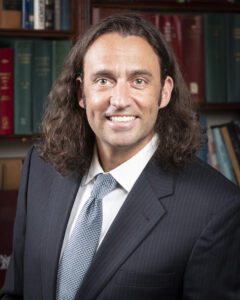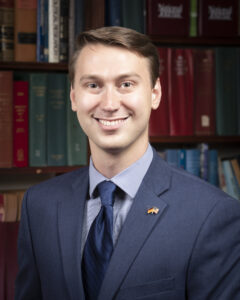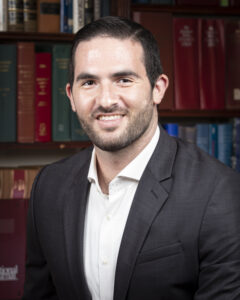Scientists in Service
Meet the Current Eagleton Science Fellows
February 15, 2022 – Eagleton Science Fellows are serving as full-time science advisors in New Jersey state government and are assisting in the development and implementation of state policy for issues ranging from COVID-19 response, clean energy, sustainability, insurance of coastal properties, and others. Some of this year’s Science Fellows shared their experience of applying their scientific expertise to state policy. Read the Q&As below to learn more.
 Meet Eagleton Science Fellow Gabriel Moore, Ph.D.
Meet Eagleton Science Fellow Gabriel Moore, Ph.D.
The Eagleton Science Policy Fellowship has provided an unmatched opportunity to pursue my passions as a scientist and advocate for health equity in a meaningful way after my doctoral studies.
Gabriel Moore has a doctorate in molecular biology from Princeton University. As part of the Eagleton Science and Politics Fellowship, Moore is serving as a science aide at the New Jersey Department of Health.
Tell us about yourself.
My name is Gabriel Moore (he/they) and I currently work in the Office of Minority and Multicultural Health at the New Jersey Department of Health as an Eagleton Fellow. I originally hail from South Carolina but moved northward to complete my doctorate in Molecular Biology at Princeton University. My work focused on identifying clinically relevant infectious agents and developing tools to determine the various ways in which they cause human disease.
Describe your experience as an Eagleton Science Fellow.
As an Eagleton Fellow, I have been able to combine so many interests into one experience – from my research on pathogens that cause human disease to ensuring equity for all peoples in our global community to creating spaces that uplift and edify folks of all backgrounds. Being able to effect change in state government immediately following a PhD is not a common trajectory and the Fellowship has facilitated the transition seamlessly. I am also grateful to be a part of a cohort of likeminded, data-driven individuals that I can bounce ideas off of and learn more about the myriad of ways to enact science and public policy in state government and beyond.
Tell us about a project you are working on.
In the Office of Minority and Multicultural Health, I have worked on a variety of projects to address health inequity in vulnerable and marginalized communities with a focus on issues caused or made worse by the COVID-19 pandemic. One of my main projects is assisting the management of a CDC grant to work with community-based organizations, healthcare systems, and community leaders to spearhead COVID-19 testing, vaccination, and mitigation strategies in rural communities and communities of color. Working with over 20 New Jersey organizations and agencies, we have hired community health workers to conduct outreach and create/strengthen a “warm chain of trust” with stakeholders in these communities. Additionally, I have had the opportunity to work the NJDOH COVID-19 Call Center to ensure that our scripting is scientifically accurate and compelling to New Jersey residents enquiring about the COVID-19 vaccine.

Meet Eagleton Science Fellow Jesse Kolodin, Ph.D.
The Eagleton Science and Politics Fellowship really helped get my foot in the door into the sector of government where I could use my scientific skills to better improve public policy.
Jesse Kolodin has a doctorate in environmental science and management from Montclair State University. As part of the Eagleton Science and Politics Fellowship, Kolodin is serving as a science aide at the New Jersey Department of Banking and Insurance.
Tell us about yourself.
My name is Dr. Jesse Kolodin, and I am currently an Eagleton Science Fellow who was placed in the Department of Banking and Insurance (DOBI) as a climate change specialist. My background in research includes modeling the geo-economics of coastal storm mitigation projects and their impacts on local beachfront communities. I’m using my expertise at the department’s insurance division to help integrate data analysis into their reporting, while using the data to better understand stakeholder flood risk. Along with my dedication to the scientific community, and now working as a public servant, I’m also in my 11th year teaching as an adjunct professor at my alma mater, Montclair State University. Addition, I have been recently serving as a volunteer on the commission of my town government, Secaucus, New Jersey. I am using my scientific background and expertise to assist them in building a storm water utility program, while also helping to oversee the future implementation of several flood mitigation infrastructure projects.
Describe your experience as an Eagleton Science Fellow.
During my entire Ph.D. candidacy, I strongly believed that my work had a greater purpose than just building on the current scientific literature. The hypothesis for my entire thesis and subsequent chapters was based on community stakeholder responses to coastal mitigation projects, projects that were politically driven and sometimes viewed as a negative intervention. This very aspect of policy and community response was always at the forefront of my field of study, so I was elated to find out that the Eagleton Institute’s Science and Politics Fellowship had selected me gain the invaluable experience (for me) in this untapped realm of policy.
When I was initially placed with DOBI to work as a climate change specialist, I was confident that even though most of what I would be walking into would be outside of my primary wheelhouse, I knew there was an opportunity to make a real difference. What I found is that the insurance industry is highly prioritizing modeling the risk posed by climate change, including various ways to mitigate the financial impacts within the industry. As a regulatory entity, nobody at DOBI was directly working on this. This observation made me quickly appreciate Eagleton’s decision to place me here, where I can use my expertise to better the department’s goals.
Since being acquainted with DOBI’s insurance division, mainly the Property & Casualty Department, I have been able to use my skills to better enhance their reporting abilities (i.e., automation, data analyses using various coding environments, and the integration of GIS mapping). The material I have produced has become increasingly receptive throughout my placement.
Most importantly, what the fellowship has provided me during this time is the ability to receive external feedback from my fellow cohort group. The dialogue consists of discussing experience and concepts amongst various executive department’s and legislative/assembly offices, helping to foster active brainstorming sessions. In addition, the Eagleton Science and Politics Fellowship staff have been a great source of both motivation and critical feedback when it comes to my next steps in life. Their advice has been extremely helpful when searching for answers about my current status and future professional development. Most importantly, the fellowship has provided me a foot in the door, a way that has allowed my scientific abilities to be utilized in a policy/regulatory setting during this much needed point in time. The exposure to government is something I cannot think would have been possible without the help of this fellowship.
Tell us about a project you are working on.
My initial role with DOBI began by becoming acquainted with the overall insurance industry, while also learning about the most up-to-date catastrophe risk groups and their discussions related to the impacts of climate change. About a month into the fellowship Hurricane (Tropical Storm) Ida happened, which quickly shifted my role into a data analyst and chief reporter of classified monthly insurance claim statements for the commissioner’s office. I was part of the initial decision-making process to integrate a new reporting system for all major catastrophic storm events moving forward, beginning with Ida. So far, I have produced 5 reports of this kind for the commissioner’s office and plan to generate a final report (somewhere down the road) that integrates GIS maps.
Since the production of these Ida reports, my role has expanded threefold, where I am now working with a team on the data input and analysis of biannual homeowner reporting, as well as spearheading a once-stale Catastrophe Plan Reporting (CAT-Plan). At the halfway mark of my fellowship, I find myself knee deep in various email exchanges that include the digital collection of datasets, while also training myself to become a strongminded regulator, what I believe to be a direct reflection of DOBI’s trust and value they have for me. The relationship with my supervisor has become an invaluable asset to my growth and development throughout this fellowship.
If I am retained as a public servant, I have great intentions to use these datasets (and others in the future) to expose and attempt to fix several flawed insurance practices that are making it tougher for NJ residents to acquire the proper insurance to reduce their risks, at an affordable price.
 Meet Eagleton Science Fellow Zixuan Wang, Ph.D.
Meet Eagleton Science Fellow Zixuan Wang, Ph.D.
The Eagleton Science and Politics Fellowship has helped me better understand government policies and the political process that take place within the laws created by the legislature.
Zixuan Wang has a doctorate in chemical engineering from University of Michigan. As part of the Eagleton Science and Politics Fellowship, Wang is currently serving as a science aide in the New Jersey State Legislature for the Assembly Majority Office.
Tell us about yourself.
My name is Zixuan Wang and I received my Ph.D. from the University of Michigan in chemical engineering. Specifically, my thesis focused on developing catalysts for the electrochemical conversion of nitrates in water sources to ammonia.
Describe your experience as an Eagleton Science Fellow.
As an Eagleton Science Fellow, I have been placed to work as a policy analyst in the Assembly Majority Office, where I work to usher bills through the legislative branch of the New Jersey government. I am currently co-staffing the Environment, Education, and Telecommunications and Utilities committees. This line of work is different from some of the other fellows placed in the Executive branch because I do not have one specific project. Instead, most of my time is dedicated to formulating new ideas for bills, fielding calls from stakeholders, and updating bill comments that move through committees.
 Meet Eagleton Science Fellow Sawyer Morgan, Ph.D.
Meet Eagleton Science Fellow Sawyer Morgan, Ph.D.
The Eagleton Science and Politics Fellowship has allowed me to transition from the laboratory to government and apply my scientific experience to the policymaking process.
Sawyer Morgan has a doctorate in chemical engineering from University of Washington. As part of the Eagleton Science and Politics Fellowship, Morgan is serving as a science aide at the New Jersey Board of Public Utilities.
Tell us about yourself.
I am Dr. Sawyer Morgan and I am a Science Fellow placed at the New Jersey Board of Public Utilities in the Division of Clean Energy. I earned my Ph.D. in chemical engineering from the University of Washington, working on nanomaterial synthesis. I am interested in all facets of the zero-carbon energy transition.
Describe your experience as an Eagleton Science Fellow.
As an Eagleton Science Fellow, I have contributed to the development of rules and incentive programs for solar power, energy storage, and electric vehicles in New Jersey. It has been a terrific experience so far working with talented policymakers who share a goal of making clean energy technologies more accessible to residents and businesses. The legislature and governor have set ambitious goals for us to support these vital industries, which will help us reach the targets set in the state’s Energy Master Plan. It’s easy to see the influence this work has on the state, supporting thousands of jobs and advancing the clean energy economy.
Tell us about a project you are working on.
New Jersey is the most densely populated state in the country, so there is limited land available for developing solar projects without causing the loss of forests or farmland. I have been coordinating a study for the BPU that will help us better understand the market potential of solar power in the state. How much energy can we expect to get from residential and commercial rooftops? How much land of different types is economically accessible? This will instruct how we can structure our incentives to encourage development at lower impact and cost. I have also contributed to the BPU’s development of a pilot program for dual-use solar, where solar panels are co-located with crops or animals, reducing land use change and potentially improving agricultural productivity. New Jersey also has some of the nation’s largest floating solar projects, and I am investigating how this new technology fits into our incentive programs.
 Meet Eagleton Science Fellow Joseph Gurrentz, Ph.D.
Meet Eagleton Science Fellow Joseph Gurrentz, Ph.D.
The Eagleton Science & Politics Fellowship put me in the position to leverage scientific understanding to address real-world problems more directly than I could have in the lab.
Joseph Gurrentz has a doctorate in inorganic chemistry from The University of Texas at Austin. As part of the Eagleton Science and Politics Fellowship, Gurrentz is serving as a science aide at the New Jersey State Legislature Senate Majority Office.
Tell us about yourself.
I’m Joey, a Ph.D. chemist and Eagleton Science Fellow placed in the Senate Majority Office. My academic studies focused on developing new chemically-modified silicon electrodes for solar energy conversion, energy storage, and molecular electronics applications. I am therefore grateful to be a co-aide to the New Jersey Senate Environment & Energy Committee, where I get to inform the development of policy mechanisms that combat climate change, air pollution, and other environmental challenges. I was also recently made the aide to the Senate Labor Committee!
Describe your experience as an Eagleton Science Fellow.
Long have I been driven to leverage science to benefit humanity, and never have I had more direct and tangible opportunities to do just that than in my Eagleton placement. As a research associate in the Senate Majority Office, I get to leverage the skills and subject matter expertise I developed through my Ph.D. to help shape public policy. Specifically, I regularly meet with stakeholders impacted by prevailing and proposed legislation to work through issues and develop provisions to ensure that New Jersey’s environmental, energy, and labor-focused laws are fair, evidence-based, and fulfil their intended purposes. I also regularly perform background research and write memos, one pagers, and other informational materials that inform senators as they formulate their opinions on bills that move through the legislature. It amazes me every day that I get to do this impactful work as a Fellow, and it is an honor that I will be able to continue this work following my tenure as an Eagleton Fellow, hired on as full-time research associate.
Tell us about a project you are working on.
There is a very high throughput of projects through the legislature. We always have lots of irons in the fire. For example, over the last legislative session I contributed to several impactful, environmentally-focused bills that passed into law. This including legislation that bans the use of neonicotinoid pesticides across the state, institutes post-consumer recycled content standards for certain plastic and paper products sold in the state, and prohibits the sale of single-use plastic carryout bags. One project I am working on right now involved helping organize a Senate Environment & Energy Committee hearing in which we are inviting representatives from New Jersey’s top universities, along with Department of Environmental Protection Commissioner LaTourette and Board of Public Utilities President Fiodaliso, to take testimony on the effects of climate change in New Jersey and what the State should be doing to lower its carbon emissions. That is in addition to developing and refining a bill (that is very near and dear to my heart) that would provide financial incentives to the accelerate the deployment of energy storage systems across New Jersey.

